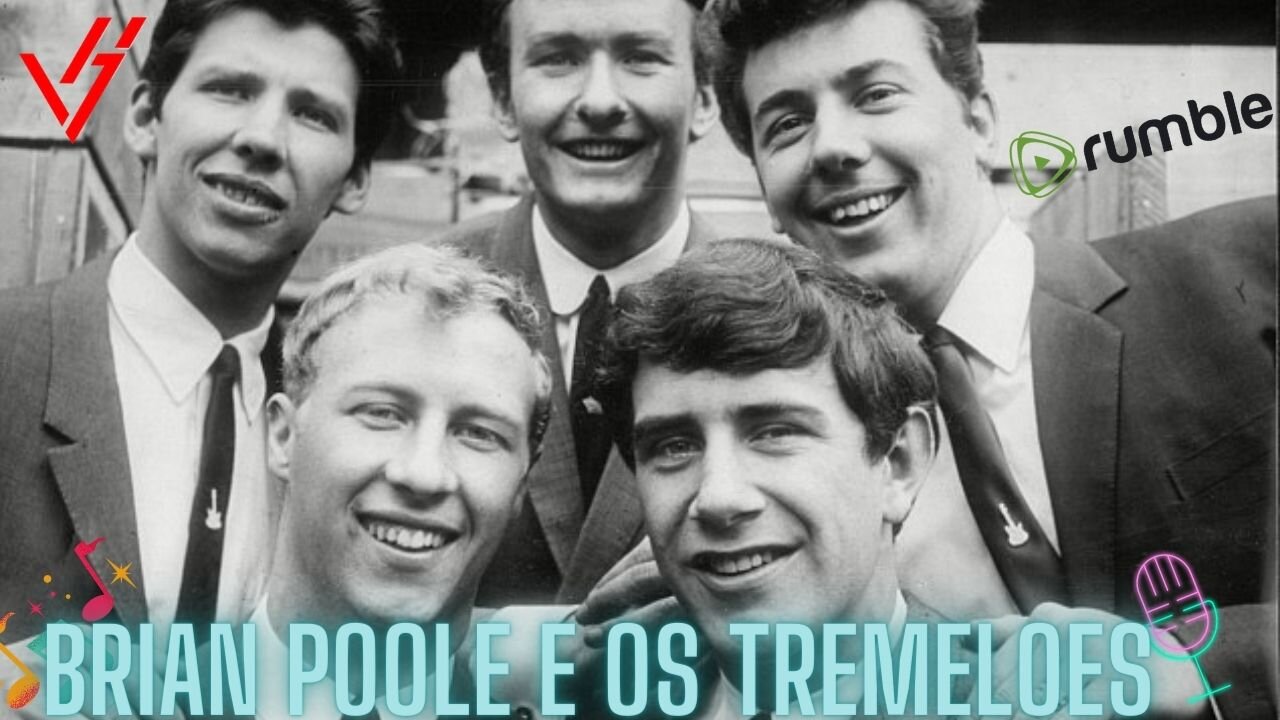Premium Only Content

Brian Poole and the Tremeloes
00:00 - Brian Poole and the Tremeloes
00:06 - 1 - biography:
It's difficult for anyone who has heard them not to like -- or even love -- the Tremeloes. They were one of the more prodigiously talented British pop/rock bands of the 1960s, and they threw that talent into the making of amazingly catchy and well-crafted singles that lit up the charts and radio on both sides of the Atlantic for four years running, from 1966 through 1970.
Yet, the Tremeloes are also one of the least-known and least-respected of 1960s English bands. The precise reason for the lack of respect is difficult to pin down, except perhaps that their timing was out, as far as making the most of their success. They generally didn't write their own material, and they cut their best singles long after the British Invasion (and the mystique surrounding the bands that were part of it) had ended. And, yet, ironically, the Tremeloes are also one of the longest surviving English rock & roll bands, playing regularly more than 40 years after the group's founding.
01:08 - 2 - Start:
The band first got together in 1958, when the original members were all in their teens. They were closer in years and background to early British beat bands like the Shadows than to the British Invasion bands with which they subsequently became associated. The original lineup of Brian Poole (vocals, guitar), Alan Blakley (drums), Alan Howard (sax), and Graham Scott (guitar) had Buddy Holly's Crickets as their inspiration. This version of the band didn't stay together long, however, and Blakley quickly switched to guitar (which Poole relinquished) after Dave Munden joined on the drums. Munden proved not only to be a very talented percussionist but also a good singer. This gave the group a third vocalist, which would prove essential to their success further on in their history. Alan Howard also switched to bass soon after Munden joined.
02:05 - 3 - Recognition:
The band -- then known as "the Tremilos" thanks to a misspelling -- built up a following at local dances and clubs, and then broke into the U.S. air-base circuit, where the length of the sets that they were forced to play required them to learn a massive number of new songs. By 1961, they had turned professional. The group's lineup changed again around that time when Graham Scott left and was replaced by Rick West (born Rick Westwood), who had previously played with Tony Rivers & the Castaways.
02:39 - 4 - Success:
West's arrival was key to the group's long-term success, providing the band with a top-flight (indeed, classically trained) guitarist. They also got a professional manager in the guise of Peter Walsh, who already represented such acts as the Brook Brothers (England's answer to the Everly Brothers) and the vocal group the Kestrels. The band's first break happened soon after when they were spotted by Jimmy Grant, the producer of the BBC's Saturday Club music showcase, who got them an audition for the BBC. This led to the group becoming regulars on radio, and, in turn, resulted in an audition for Decca Records on New Year's Day, 1962. At the time, Decca was looking for a new rock & roll act, and the Tremeloes were up against a relatively obscure Liverpool quartet called the Beatles. Decca executives Dick Rowe and Mike Smith were in charge of the auditions, with Rowe reportedly leaving the choice up to Smith. The latter chose the Tremeloes, reportedly based on the fact that they were based in London and, thus, would be more accessible than the Beatles.
The signing had a range of consequences for the band and its future. At the time, it was routine for groups to have a featured member, Cliff Richard & the Shadows being the prime example; thus, the label insisted that the band be signed as Brian Poole & the Tremeloes.
The band accepted this as one price of pursuing success, and Poole became the perceived star of the band. They cut a series of records backing other artists -- including the Vernons Girls ("The Locomotion") and DJ Jimmy Savile, on the latter's version of "Ahab the Arab," as well as some failed singles of their own -- got into the lineup of artists in the juke-box comedy film Just for Fun, and generally missed even modest chart action by the length of their fingertips; their singles of "Twist Little Sister" and "Keep on Dancing" failed to find audiences, despite some valiant efforts at promotion. Success seemed to become less likely as 1963 wore on and a new wave of English rock & roll acts, spearheaded, ironically enough, by the Beatles, began dominating the radio and the charts.
Rather than wilting in this new environment, Brian Poole & the Tremeloes rose to the challenge. They changed their look and pumped up the rhythm-guitar parts in their songs, and began looking at R&B, rather than white rock & roll, as a source of material and inspiration.
The result was their version of "Twist and Shout," which managed to rise to number four on the English charts, despite running up head-to-head with the Beatles' recording, issued on an EP that summer. Their next record, a cover of the Contours' hit "Do You Love Me," was a classic of the era, an honest, authentic-sounding screamer of a single that hit number one in England once the Beatles' "She Loves You" vacated the spot, and managed to eclipse a rival version by the Dave Clark Five. In its wake, Brian Poole & the Tremeloes managed a series of respectable, even occasionally inspired hits over the next two years, including a U.K. Top Ten cover of Roy Orbison's "Candy Man" and a convincingly raucous rendition of the Strangeloves' Bo Diddley-beat-driven anthem "I Want Candy."
They appeared on film, most notably a pair of performance clips in the feature film Go Go, Big Beat, and a featured spot in A Touch of Blarney, and made the rounds of the television-music showcases, charting moderately well until the end of 1965. The band ran into hard times just about then, owing to issues of music and style.
Possibly it was a result of the fact that they'd never really been part of the British Invasion, but the Tremeloes had never seen fit to update their image, which had been something of a pose to start with. They still dressed in matching suits on stage, and performed the same brand of stomping covers of American R&B and rock & roll. It was no longer possible to expect those to chart, however. Their competition wasn't the Dave Clark Five or Gerry & the Pacemakers, but the likes of much heavier and musically higher-powered bands such as the Yardbirds and the Kinks, not to mention the rapidly evolving Beatles and Rolling Stones; all of whom seemed to up the musical ante, in terms of what sounds and instruments they brought to the table, with each new release. Additionally, Poole had emerged as the star of the group and developed a star mentality, and became convinced that his future lay in a career as a pop-oriented vocalist, in the manner of such up-and-coming figures as Tom Jones. The chart failure of their cover of the Olympics' "Good Lovin'" brought a halt to the success the quintet had been enjoying, and started Poole looking out for his own interests and future.
07:26 - 5 - Active:
Beyond that point, the group seemed to lose its rudder. They tried sounding heavy ("Right Wheel, Left Hammer, Sham") and country ("Hello Buddy"), spoofing glam rock with "Blue Suede Tie," and even changed their name (the Trems). By the mid-'70s, the Tremeloes were playing in cabaret, a strategy similar to that of the Searchers and a few other surviving '60s bands. They never stopped working, or were without work, however; Dave Munden was there on drums and Rick West stayed on guitar, and the group cut music for DJM, Pye, and Polydor intermittently, before briefly returning to CBS in the early '80s.
In the late '90s, Munden and West were still there, with keyboardist/singer/engineer Joe Gillingham and bassist/guitarist/singer Davey Freyer, playing regular gigs in England and Europe. The group's Decca sides with Poole (who since re-emerged as a singer, sometimes billed on CDs as "Brian Poole OF the Tremeloes") have been reissued on CD by Decca Records, but are rather difficult to find; by contrast, Rhino, Sequel, and Repertoire Records each has out a collection of the Tremeloes' post-1965 hits. The band keeps an active website up and bids fair, at this rate, to be busy for their golden anniversary in rock & roll before the end of the first decade of the 21st century.
Research: Vitor hugo Lizardi Leonardi
Hello friend, I am a big music lover and because I thought that without music I would be nothing in this life, I created this channel, the soul is the root of music, and in my humble view, everything we hear today of good music is related to the soul . If you liked it, leave your Like and subscribe to the channel of this force so that new content like this can be produced, thank you very much.
Come meet me, and give your opinion about the channel, for me it's very important!
—— TALK TO ME.
Research: Vitor hugo Lizardi Leonardi
facebook: facebook.com/vitor.leonardi
instagran: instagram.com/vitorleonardi/
twitter: twitter.com/vitorleonardi
email: vitorleonardi99gmail.com
Good reading ,The 7 Habits of Highly Effective People
https://www.amazon.com.br/Habits-Highly-Effective-People-Powerful/dp/1982137274/ref=asc_df_1982137274/?tag=googleshopp00-20&linkCode=df0&hvadid=379726347250&hvpos=&hvnetw=g&hvrand=6784634493429849819&hvpone=&hvptwo=&hvqmt=&hvdev=c&hvdvcmdl=&hvlocint=&hvlocphy=20104&hvtargid=pla-908915591470&psc=1
Music credit:
Twist And Shout
Performed: Brian Poole the tremeloes
Composed: Bert Berns, Phil Medley
Produced: Mike Smith
Source: Decca Music Group Ltd.
Hello friends, If you liked it, don't forget to LIKE and SUBSCRIBE to the channel, strengthen our work, it's very important, to expand the channel. I'll tell you, thank you
Hello friend, I am a great music lover and because I think that without music it would be nothing, I created this channel, soul is the root of music, and in my humble view, everything we hear today about good music is related to soul. If you liked it, leave your Like and subscribe to the channel of this force so that new content like this can be produced, thank you very much.
BLACK SOUL CHANNEL- And music or video and history of musicians.
We strive to find the best and most enjoyable text and music for you! We hope to make your days more beautiful with texts and music that make you think and music to relax! Text, love and music. I'm also a writer, I'm working on this project!
contact email and we will respond within 48 hours vitorleonardi99@gmail.com
#Brian Poole and the Tremeloes,#passionate music,#pop-rock,#1960s,#released,#talented,#captivating,#lit up,#lit up the charts,#radios,#atlantic,#British,#hits,# group foundation,#vitorleonardi
-
 14:53
14:53
Stephen Gardner
5 hours ago🔥Alex Jones WARNS Trump not to DEFAULT on THIS!!
41.1K147 -
 31:54
31:54
The Why Files
5 days agoThe Quantum Apocalypse: All Your Secrets Revealed
103K59 -
 7:05:17
7:05:17
Sgt Wilky Plays
8 hours agoSaturday Hangout and Games
59K4 -
 8:23:23
8:23:23
DeadMan88
10 hours agoWGT Golf Road to Master
36.8K3 -
 1:35:04
1:35:04
Winston Marshall
2 days ago“This Wasn’t Accidental!” Maajid Nawaz SPEAKS OUT on R*PE Gangs and The REAL Cover-Up
114K65 -
 23:46
23:46
barstoolsports
10 hours agoSurviving Barstool Drama Spills Over Into The Office | Stool Scenes
78.9K4 -
 5:11:58
5:11:58
Shield_PR_Gaming
12 hours ago01/18/25. Let's chill with MMORPG and then some shooters!! Read Description! You know you want to!!
54.3K2 -
 1:09:39
1:09:39
Tactical Advisor
11 hours agoTrump Inauguration & New Gun Releases | Vault Room Live Stream 014
50.1K5 -
 11:27
11:27
Adam Does Movies
23 hours ago $6.89 earnedWolf Man Movie Review - Does It Bite?
73.2K13 -
 11:57
11:57
inspirePlay
1 day ago $13.17 earnedLongest Drive Wins! Elite Long Drivers Battle in Par 4 Elimination
131K17